Elections are a critical time to speak up about the importance of animal welfare, and the BC SPCA would like to thank the caring British Columbians who did just that.
In the lead-up to the election, the BC SPCA asked B.C.’s political parties and candidates to include six animal welfare policies in their election platforms. We also invited B.C. voters to sign up to receive more information on our policy recommendations, as well as an election toolkit and an email template to send to candidates.
- More than 16,000 caring people participated in our campaign and ranked their top three animal welfare policy priorities.
- 362 people downloaded our election toolkit to help them talk to their candidates.
- 4,250 emails were sent to election candidates, urging them to commit to taking action for animal welfare if elected.
And the politicians were listening! We’re thrilled that one major party included our call for more pet-friendly housing in their platform and several independent candidates committed to take action for animal welfare if elected. This recognition of animal welfare as an important election issue is a huge achievement. It demonstrates just how important farmed, wild and companion animals are to British Columbians.
With your ongoing support, we will continue advocating for the animals and people of this province. We look forward to working with B.C.’s new government to ensure that animal welfare remains a priority.
Your priorities
Campaign supporters ranked their top three animal welfare priorities for our new provincial government:

Review our 6 Animal Welfare Priorities:
Vote for animals
Two-thirds of B.C. households include pets as important and loved family members. But pet-friendly housing is hard to find and often more expensive, especially for vulnerable people who already face housing barriers.
“The BC SPCA is seeing an increase in people needing to surrender their pets because of a lack of pet-friendly housing options. Many families all over the province are being forced to rehome their pets to keep or find a place to live” explains Kahlee Demers, BC SPCA Community Animal Centre Manager.
Chase, Cashew, Walnut and Indie are just a few of the very loved pets who ended up in BC SPCA care recently because of housing issues. It’s a heartbreaking situation for these animals and the people who love them.
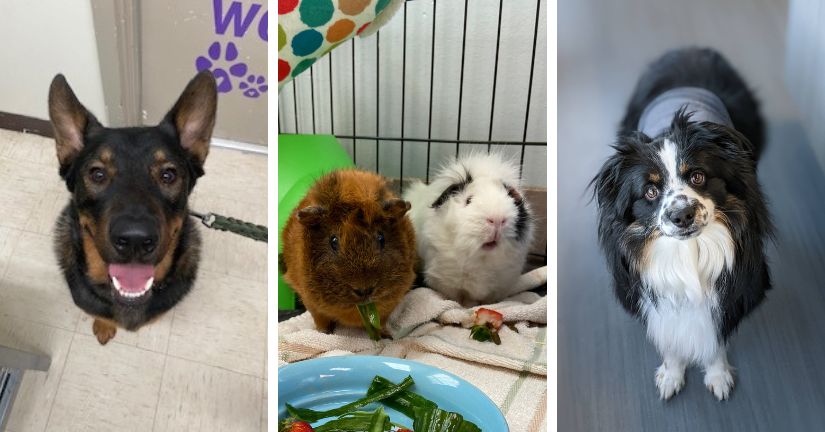
When Melissa’s family found out their rental home’s new owner wanted to move in, she knew it would be hard to find a new home that welcomed their dog, Gin. Most of the rentals she found didn’t allow pets at all, and those that did often had breed or size restrictions that excluded sweet Gin.
After an exhausting search, Melissa, her husband and Gin had to move to a different community much further away from Gin’s veterinary clinic where she receives care from several specialists. While they feel lucky to have found a new home where Gin is welcome, they now have to commute 45 minutes longer to work and pay much higher rent.
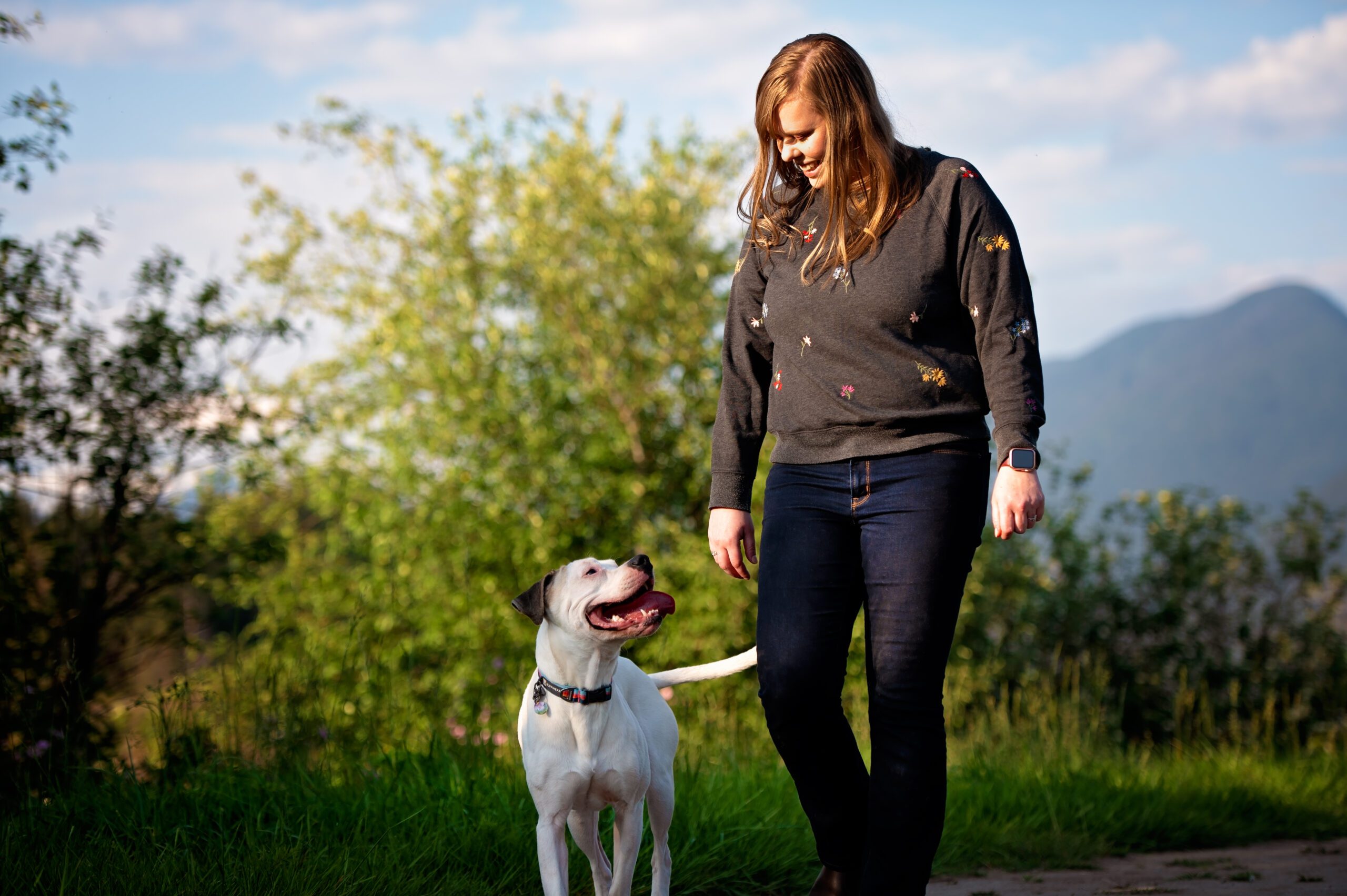
We need government leadership so British Columbians can live with and be supported by the animals they love while ensuring landlords and strata have appropriate protection and mechanisms to resolve disputes. We’ve asked B.C. political parties to bring tenants, landlords and other stakeholders together to find collaborative solutions.
Please share this campaign with your friends, family and B.C. political parties and candidates to help us call for change!
We’re greateful that the B.C. government listened to our previous advocacy and the new Emergency and Disaster Management Act requires that animals be included in risk assessments and emergency management plans. But that was just the first step.

Animals, and their guardians, need to be considered and supported before, during and after emergencies. “Excluding animals from emergency planning, response and recovery can have deadly consequences” explains Bill Penhallurick, the BC SPCA’s manager of emergency response. “Animal lives can be lost, their guardians may delay or fail to evacuate, people might enter evacuation zones to rescue animals, and emergency responders may be forced to enter hazardous areas to rescue those who have remained. And when people do evacuate with their animals, they have the added stress of finding a place for their pets as well as food, supplies and veterinary care.”
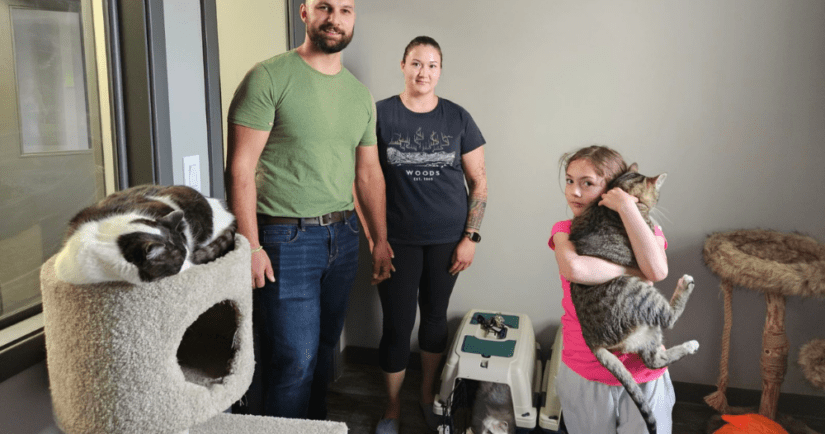
When Shealene’s family was evacuated from the Fort Nelson wildfires earlier this year, she was lucky to find a hotel that allowed her whole family to stay, including their five cats. But the situation was far from ideal, as the cats would have to stay in their crates except during mealtimes and to use the litterbox. As you can imagine, this was distressing for Shealene.
Thankfully, the BC SPCA offered emergency boarding at the nearest Community Animal Centre where all five cats could stay in a single room together. BC SPCA staff sent the family frequent updates, photos and videos throughout their 15-day stay until they could be reunited as a family. Knowing their cats were safe, well cared for and happy meant one less thing for the family to worry about during a very stressful time.
We must keep animals and people safe in emergencies, which is why we’re asking B.C.’s political parties to:
- Expand provincial Emergency Support Services to include help finding pet-friendly accommodations and accessing animal food, supplies and veterinary care,
- Include food and essential supplies for animals in post-emergency financial assistance, and
- Recognize the critical role that animal welfare organizations play, include them in consultation and information-sharing, provide training and protection for their staff and volunteers, and reimburse their operating costs
Download our emergency checklist for families with pets and disaster preparedness checklist for horses to help you plan ahead.
Will you advocate for the safety of animals and people in the upcoming election?
Please share this campaign and ask others to sign up to demonstrate their support.
Those who sign up will receive more information about each platform issue over the summer, and tools to help advocate directly to election candidates in the fall.
British Columbians are demanding transparency and accountability for the care of farmed animals. However, there is no proactive, independent compliance system to monitor, enforce and report on the welfare of over 22 million farmed animals raised in B.C. each year.
Last year, the BC SPCA participated in the Ministry of Agriculture and Food’s Farmed Animal Welfare Advisory Committee, along with farmers, meat processors, veterinarians, researchers and representatives from the National Farm Animal Care Council.
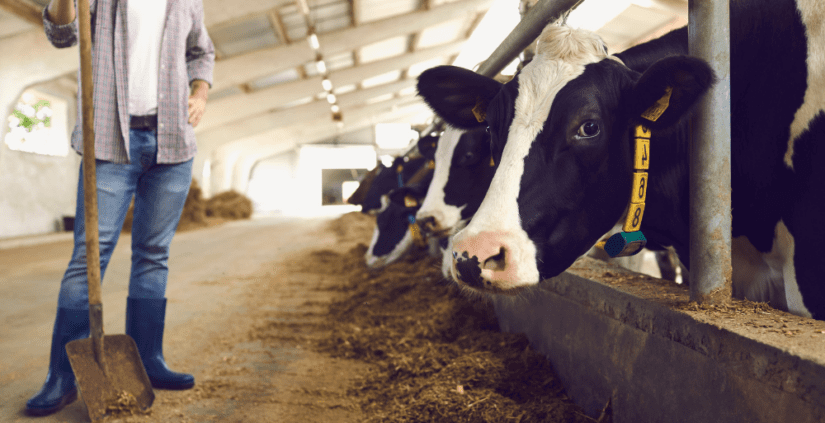
Although the Committee members shared different experiences and perspectives, they reached a consensus on what needs to be done to improve the welfare of farmed animals in B.C.
The Committee recommended that the provincial government create a new inspection and enforcement function within the Ministry of Agriculture and Food to respond to complaints of farmed animal distress, conduct proactive inspections to make sure minimum animal welfare standards are being adhered to, and publish an annual report on animal welfare in B.C.
The Committee also recommended that the new provincial agency should:
- Identify farms that are not affiliated with industry organizations and make sure they are aware of and complying with minimum animal welfare standards,
- Improve animal welfare during transport and processing,
- Better protect farmed animals from climate change and during emergencies,
- Increase the number of farmed animal veterinarians in B.C., and
- Invest in a One Welfare approach to address farmed animal welfare and farmer well-being together.
We’ve asked B.C.’s political parties to implement the Advisory Committee’s recommendations in their entirety and with sustainable funding to improve animal welfare on B.C. farms, increase public trust in local agriculture and support farmers.
Will you call for better farmed animal welfare in the upcoming election?
Please share this campaign and ask others to sign up to show their support. Campaign supporters will receive tools to help them advocate directly to B.C.’s political parties and election candidates in the fall.
British Columbians love their pets, and when money is tight people may even feed their animals before themselves. The BC SPCA provides free pet food and supplies at our Community Animal Centres and through partnerships with other community organizations, but relying on public donations isn’t sustainable and coordinated action is needed.
“When someone comes to the BC SPCA’s pet food banks for help, they’ve often exhausted other options and are only left with the difficult decision to care for themselves or their animals”, explains Diane Waters, outreach specialists for the BC SPCA. “They care so much about their furry family members that they’d forgo their own meals to make sure their pets are taken care of during hard times.”
For a while, Paul and his sweet cat, Megalove, relied on a BC SPCA pet food bank for Megalove’s food. That support meant neither of them had to go hungry when they were experiencing some tough times. Now they stop by to visit the staff and volunteers and get a few treats and scritches for Megalove. Paul actively supports his community through his work with the Binners Project and Megaphone Magazine, and Megalove supports Paul.
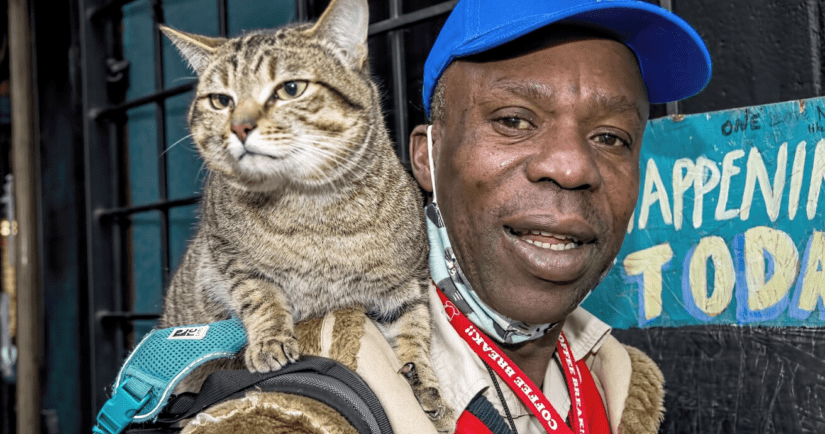
Last year, the BC SPCA’s network of pet food banks provided over 717,000 meals for hungry pets, and the high demand continues to rise. Unfortunately, we’ve also seen donations decrease as everyone struggles through the current cost of living crisis.
Relying solely on donations to feed hungry pets and people just isn’t sustainable. We’ve asked B.C.’s political parties to include pet food and supplies in food banks and other food security programs supported by the provincial government to help feed and care for vulnerable people and animals in our communities.
Can you help put food on everyone’s plate this October? Please share this campaign to raise awareness and call for change in the upcoming provincial election!
Microchips provide unique and safe permanent identification for pets and help to reunite lost animals with their families.
“Unlike collars and tags that can fall off, and tattoos that can fade or be altered, microchips provide unique, permanent identification for pets” explains Priscilla Cheung, manager of the BC Pet Registry program. “Dogs with microchips are two to three times more likely to be returned to their owner, and cats with microchips are up to 20 times more likely to be returned!”
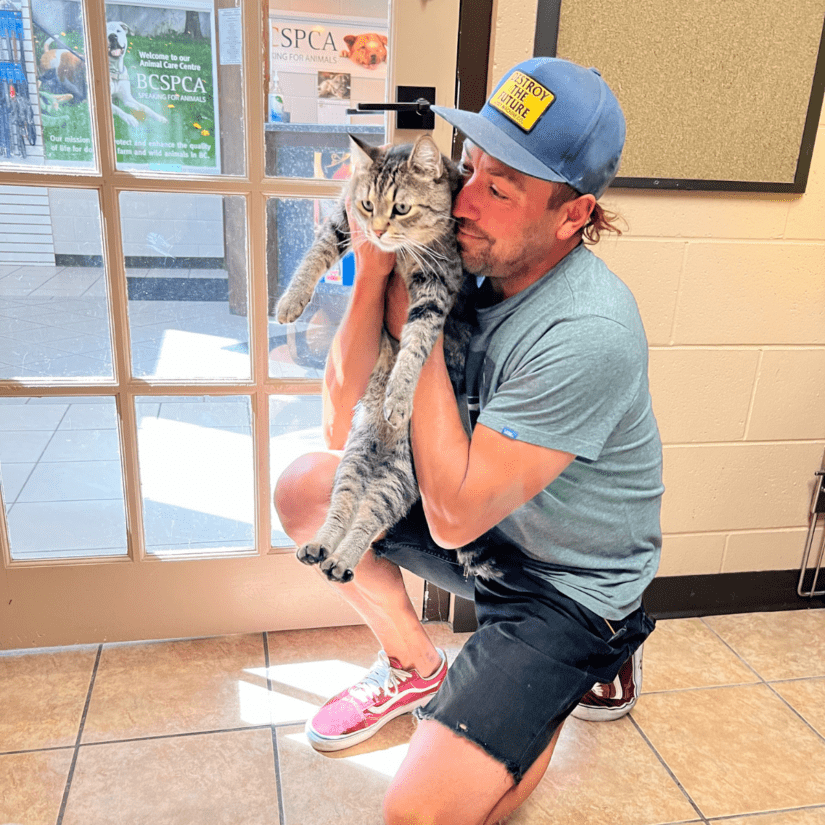
When a caring person found poor Norman out by himself in a storm, they took him straight to a BC SPCA Community Animal Centre where he could be scanned for a microchip. Thankfully, Norman’s chip was registered and up to date, leading to a heartwarming reunion with his worried family and a safe return home within just a few hours of being lost.
Microchips can also help responsible breeders maintain accurate health records and be used to track disease outbreaks and animals with inheritable disorders. Many other places, including the United Kingdom, most of the European Union, Japan, parts of Australia and the City of Montreal now require cats and dogs to be microchipped.
We’ve asked B.C.’s political parties to require that all cats and dogs bred, brokered, sold and owned in our province be identified with a microchip registered in an internationally recognized database.
Find out more about microchips and the BC Pet Registry.
Will you advocate for permanent pet identification in the upcoming election?
Please share this campaign and ask others to sign up to demonstrate their support. Those who sign up will receive more information about each platform issue over the summer, and tools to help advocate directly to election candidates in the fall.
The deep connections between people, animals and the environment have always been there, but now they are gaining much-needed recognition around the world, including here at the BC SPCA. The One Health/One Welfare approach recognizes that the health and well-being of animals, people and the planet are closely intertwined, and that we need to connect animal welfare, human health and social support and environmental stewardship.

Examples of One Health and One Welfare in action:
The One Health approach shows that more strictly controlling the exotic animals imported, bred and sold in B.C. would benefit people, animals and the environment by:
- Preventing animal suffering and death,
- Protecting wild populations and ecosystems in source countries,
- Protecting people and other animals from injury and disease, and
- Preventing local ecosystem impacts from exotics that escape or are released in B.C.
The One Welfare approach shows that we can better identify and prevent both domestic violence and animal abuse by:
- Recognizing that people who harm animals are more likely to mistreat vulnerable people (and vice versa),
- Educating animal welfare and human social service providers about this violence link, and
- Encouraging cross-reporting of abuse between sectors.
Our province and our communities are facing increasingly complex public and mental health, animal welfare, biodiversity, infectious disease, climate change and environmental challenges.
Ignoring the connections between people, the ecosystems we live in and the animals we share this province with will only create more problems, which is why we’ve asked B.C.’s political parties to commit to evaluating issues, decisions and policies through a One Health/One Welfare lens to find holistic, interdisciplinary solutions that benefit everyone.
Will you advocate for solutions that recognize we’re all connected?
Please share this campaign and ask others to sign up to demonstrate their support. Campaign supporters will receive tools to help them advocate directly to their local candidates before the October 19 provincial election. Remember, your vote is their voice!
Stay up to date and learn about other important BC SPCA advocacy campaigns by subscribing to our Action Alerts.
